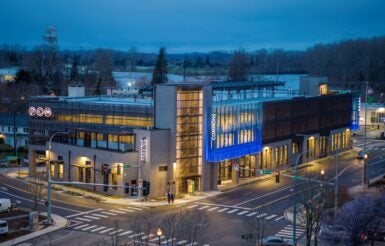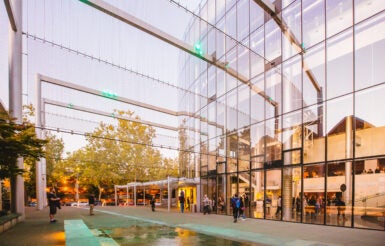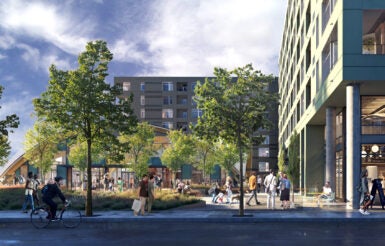Michael Ballantyne, co-owner of a three-story office building in Boise, had a problem. His anchor tenant’s lease was up and the company was thinking about leaving.
Michael Ballantyne, co-owner of a three-story office building in Boise, had a problem. His anchor tenant’s lease was up and the company was thinking about leaving.
About 70 Regence Blue Shield of Idaho employees went to work each day at Ballantyne’s building in the Linen District just west of downtown. Their offices were often drafty and uncomfortable, despite frequent calls to the maintenance staff.
It was important to Regence executives that their Boise office space reflect the company’s commitment to sustainability, exemplified by their “Healthy Workplace, Healthy Lifestyle” initiative. Aware of the abundant supply of competitive space nearby and not fully satisfied with the Capitol Gateway building, Regence was considering a move.
Ballantyne, Managing Partner of Thornton Olive Keller Commercial Real Estate, wanted a more comfortable, “greener” building, too, and not just to make Regence happier. Not only is Ballantyne a building owner, TOK shares ownership and also manages the property.
Ballantyne and his partners wanted to keep Regence, but they also wanted to attract a deeper pool of high-quality tenants, higher rents and, ultimately, the market cache that comes with owning a “best in class,” energy-saving property.
More than that, they wanted to establish TOK as a market leader in Idaho for green buildings. If TOK could enhance the Boise building, they could apply what they learned to increase the value of the other properties they manage—about 5.5 million square feet of office, industrial and retail real estate across the state.
Building Renewal
In 2013, BetterBricks, a commercial building program of the Northwest Energy Efficiency Alliance (NEEA), set out to uncover new savings opportunities for Capitol Gateway Plaza. The goal of BetterBricks is to accelerate the adoption of energy-efficient best practices in the commercial industry.
BetterBricks created a strategy to support the adoption of a real estate strategy called building renewal that helps owners, managers and tenants conduct whole-building, deep energy-efficiency retrofits of existing properties. This strategy guides owners, as well as design and construction professionals, and helps reveal the wide range of opportunities for revamping existing building stock to achieve significant energy savings.
The process improves the bottom line and asset value for owners and reduces costs for tenants, and can provide a path to LEED certification and improved ENERGY STAR® scores.
In Boise, building renewal promised to provide TOK with a customized, integrated plan for improving the building’s energy performance, enhancing its market position and competitiveness, and increasing its asset value.
Stage One: Technical And Financial Analysis
The Boise project was a collaboration of NEEA staff; contractors and consultants, including the University of Idaho- Integrated Design Lab (IDL); the building ownership team and Idaho Power.
IDL began by running a pressure test—sealing all the doors and windows, then checking for leaks. The test revealed that the front entrance had never been properly insulated, which explained why the building felt so drafty. Conditioned air—cool air in the summer; heat in the winter—was also escaping from the elevator shaft, which hadn’t been properly sealed.
On top of those issues, the building’s temperature-control system was heating or cooling 100 percent outside air for the building year-round, instead of recirculating some from the inside, causing the system to work harder than it should.
The Value Of A Comprehensive Approach
Two holistic, building-wide improvement plans, called Integrated Measure Packages (IMPs), were developed for the Boise building. In contrast to a traditional, single-system retrofit, an IMP offers a comprehensive, integrated set of measures that addresses a building’s immediate problems—then goes much further.
This big-picture approach addresses the building and its various systems as a whole, revealing connections that result in more opportunities for improvements and savings. In developing each IMP, contractors and consultants perform energy modeling to estimate savings from adopting specific measures. Then, a cost estimator provides estimates of the capital costs of making the improvements.
Competitive Advantage And Other Non-Energy Benefits
For owners like TOK who want to increase the long-term value of their properties and become more competitive in their markets, non-energy benefits that would result from the improvements are integral to the business case. A financial analysis was performed to assess the potential value of non-energy benefits at a floor-by-floor and lease-by-lease level; evaluate the risks; and calculate the returns. Key benefits include:
- Reduced maintenance calls, and less time and money spent responding to them
- Greater capacity to keep current tenants and attract new, high-quality ones
- Improved ENERGY STAR® and LEED ratings, which attract higher-credit-quality government and corporate tenants that require such certifications for their office space
- The market cache and higher profile that comes with “best-in-class” and/or “greenest building” status
Stage Two: Building Owner Approval
Ultimately, Ballantyne was presented with two IMPs at different price points—he called them the “Chevy and the Cadillac.” He and his colleagues, because they both manage and co-own the building, didn’t have to go to a third-party owner for approval: “We could make the decision,” he said.
They did, however, have to account for a big hiccup in their plans: Regence, which had earlier agreed to help pay for building improvements, wasn’t able to make the numbers work. So Ballantyne was provided with a third, less expensive, less tenant-specific IMP that didn’t depend on Regence to contribute to the costs and could be phased in more slowly, over three years.
Stage Three: Implementation
The Boise building today is noticeably more comfortable. That leaky wall near the front entrance has been insulated. The elevator shaft has been sealed. A new temperature-control system, energy-recovery unit and remote-access digital controls are saving energy and helping staff and service contractors maintain a healthy, energy-efficient building.
Just as important, TOK now possesses an in-depth implementation document to guide them through completion of the recommendations. In addition, when a system fails or needs an upgrade, building managers consult this guide to make sure they consider green alternatives that may yield greater energy and cost savings.
The Boise building is one of two that make up Capitol Gateway Plaza. Ballantyne used the IMP that was created for one building to also revamp the other, an overhaul that includes a state-of-the-art building systems management system that eventually will be used throughout the campus.
“There is huge leverage here because we doubled our bang for the buck by paying for one IMP but implementing it on two buildings,” Ballantyne said.
He calls the implementation document his “playbook,” a step-by-step plan that is “worth its weight in gold.”
Stage Four: Measurement And Verification
TOK continues to implement recommendations for the Boise building as repairs and upgrades become necessary. In this stage the full impact of the improvements will be quantified and confirmed. But the projections are encouraging.
By adopting the recommendations in the IMP, the owners expect to save an estimated 45 percent annually in energy costs. Plus, the building will produce an estimated 154 fewer metric tons of carbon per year, equivalent to keeping 32 cars off the road annually.
Those savings are in addition to the all-important non-energy benefits that Ballantyne predicts will keep the building comfortable and competitive for years to come. TOK’s anchor tenant already is proving his point.
Partly as a result of the building renewal process, Regence decided to stay put, renewing their lease for another four years.
“The president of Regence said that his people are much happier, and we are getting less service calls,” Ballantyne said.
The recent improvements also helped attract a new tenant, a law firm. Ballantyne said the building renewal upgrades played a key role in securing that new lease.



